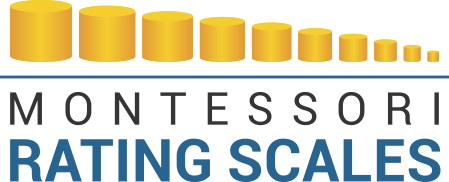MRS-EC-E (Environment)
The first Montessori rating scale – the Montessori Rating Scale – Early Childhood – Environment (MRS-EC-E) – assesses the completeness, organization and condition of the Montessori prepared environment for children 2 ½ to 6 years old. This scale does not assess “process quality,” the quality of the interactions and engagement of the children and adults. The quality of the interactions of children-to-children, children-to-adults, children-to-materials and activities, and adults-to-adults is measured by the Montessori Rating Scale – Early Childhood – Quality Principles (MRS-EC-Q.)
The MRS-EC-E contains 155 items organized into twelve (12) subscales. This rating scale measures the classic, foundational and classic curriculum areas of the classroom environment:
1. Interior Space
2. General Furnishings
3. Practical Life
4. Sensorial
5. Mathematics
6. Language Arts and Literacy
7. Fraction Materials
8. Cultural: Botany, Zoology, Geography, History, Science
9. Arts and Crafts
10. Peace
11. Outside Environment
12. Music and Movement
Importantly, the dynamic tool embedded in each rated item is the Q-PIP (Quality Program Improvement Plan). The Q-PIP provides the teacher with the opportunity to develop a plan for improvement and supports professional development through self-examination and reflection.
The enormous breadth of this scale, with 155 items, reflects the extensive and detailed Montessori curriculum. From her observation of the young child’s interests and needs, Montessori developed her materials. Montessori materials were refined after assessing the reaction of children to the materials. Each curriculum material is a distillation and embodiment of principles, designed to compel the child to repetition and deep engagement.
Process quality aspects of the environment are the non-physical elements of the environment. The Montessori Rating Scales – Quality Principles (MRS-EC-QP) assesses these features. Relationships of the child-to-adult, child-to-child, child-to-environment, and adult-to-adult are critical in the Montessori approach to education. Observable interpersonal behaviors are rated by the MRS-EC-QP.
Ten percent of the assessment items address cultural diversity, and several items address special needs/ learning differences.
Consideration for local and state laws that may prohibit certain materials or practices is also considered in the Scales.
- 1. Interior Space 79%
- 2. General furnishings 70%
- 3. Practical life 67%
- 4. Sensorial 73%
- 5. Mathematics 78%
- 6. Language arts and literacy 77%
- 7. Fraction materials 79%
- 8. Cultural 100%
- Zoology 76%
- Botany 75%
- Geography 73%
- History 72%
- Science 81%
- 9. Arts and crafts 88%
- 10. Peace 77%
- 11. Outside environment 83%
- 12. Music and movement 74%
